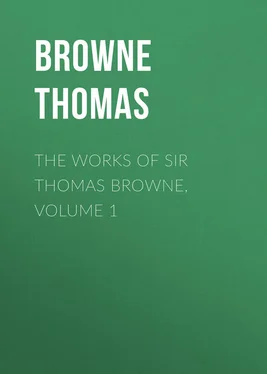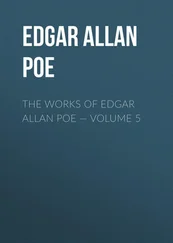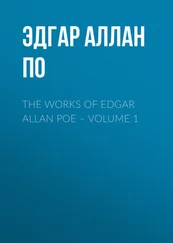Thomas Browne - The Works of Sir Thomas Browne, Volume 1
Здесь есть возможность читать онлайн «Thomas Browne - The Works of Sir Thomas Browne, Volume 1» — ознакомительный отрывок электронной книги совершенно бесплатно, а после прочтения отрывка купить полную версию. В некоторых случаях можно слушать аудио, скачать через торрент в формате fb2 и присутствует краткое содержание. ISBN: , Жанр: foreign_antique, foreign_prose, на английском языке. Описание произведения, (предисловие) а так же отзывы посетителей доступны на портале библиотеки ЛибКат.
- Название:The Works of Sir Thomas Browne, Volume 1
- Автор:
- Жанр:
- Год:неизвестен
- ISBN:http://www.gutenberg.org/ebooks/39960
- Рейтинг книги:5 / 5. Голосов: 1
-
Избранное:Добавить в избранное
- Отзывы:
-
Ваша оценка:
- 100
- 1
- 2
- 3
- 4
- 5
The Works of Sir Thomas Browne, Volume 1: краткое содержание, описание и аннотация
Предлагаем к чтению аннотацию, описание, краткое содержание или предисловие (зависит от того, что написал сам автор книги «The Works of Sir Thomas Browne, Volume 1»). Если вы не нашли необходимую информацию о книге — напишите в комментариях, мы постараемся отыскать её.
The Works of Sir Thomas Browne, Volume 1 — читать онлайн ознакомительный отрывок
Ниже представлен текст книги, разбитый по страницам. Система сохранения места последней прочитанной страницы, позволяет с удобством читать онлайн бесплатно книгу «The Works of Sir Thomas Browne, Volume 1», без необходимости каждый раз заново искать на чём Вы остановились. Поставьте закладку, и сможете в любой момент перейти на страницу, на которой закончили чтение.
Интервал:
Закладка:
The Works of Sir Thomas Browne, Volume 1
PREFATORY NOTE
This edition is an endeavour to arrive at a more satisfactory text of the work of Sir Thomas Browne, and to reproduce the principal part of it, as faithfully as seems advisable, in the form in which it was presented to the public at the time of his death. For this purpose, in the first volume, the text of the Religio Medici follows more particularly the issue of 1682. The Pseudodoxia Epidemica here given is based upon the sixth edition of ten years earlier, with careful revision. In every case in which a spelling or punctuation was dubious, a comparison was made of nearly all the issues printed during the lifetime of the writer, and their merits weighed. By this means it is hoped that the true flavour of the period has been preserved.
The Annotations upon the Religio Medici , which were always reprinted with the text during the seventeenth century, are here restored. They will appeal to a certain class of readers which has a right to be considered. It is to be regretted that every quotation given in these pages has not been verified. Several have been corrected; but to have worked through them all, in these busy days, would have been a labour of some years, which it is not possible to devote to the purpose. It has been thought best to leave these passages therefore, in the main, as they stand. 1 1 The quotation, now corrected, from Montaigne, on p. xxii, is a typical example of the pitfall into which one is liable to stumble. The passage there cited is in chapter xl. of the French author's later arrangement: a clear indication of the edition of the Essais used by the author of the Annotations. What is one to make of the readings in Lucretius on p. xxv? No light is thrown upon these difficulties by the edition of Browne's works published in 1686. Wilkin did not reprint the Annotations, except in selection.
The portrait of Sir Thomas Browne here prefixed is reproduced from the engraving published in 1672 with the edition of the Religio Medici and Pseudodoxia Epidemica .
C.S.August, 1903.
ANNOTATIONS UPON RELIGIO MEDICI
Nec satis est vulgasse fidem. —
Pet. Arbit. fragment.THE ANNOTATOR TO THE READER
A. Gellius (noct. Attic. l. 20. cap. ult. ) notes some Books that had strange Titles ; Pliny (Prefat. Nat. Hist.) speaking of some such, could not pass them over without a jeer: So strange (saith he) are the Titles of some Books , Ut multos ad vadimonium deferendum compellant. And Seneca saith, some such there are , Qui patri obstetricem parturienti filiæ accersenti moram injicere possint. Of the same fate this present Tract Religio Medici hath partaken: Exception by some hath been taken to it in respect of its Inscription, which say they, seems to imply that Physicians have a Religion by themselves, which is more than Theologie doth warrant: but it is their Inference, and not the Title that is to blame; for no more is meant by that, or endeavoured to be prov'd in the Book then that (contrary to the opinion of the unlearned ) Physitians have Religion as well as other men .
For the Work it self, the present Age hath produced none that has had better Reception amongst the learned; it has been received and fostered by almost all, there having been but one that I knew of ( to verifie that Books have their Fate from the Capacity of the Reader) that has had the face to appear against it; that is Mr. Alexander 2 2 In his Medicus Medicatus .
Rosse; but he is dead, and it is uncomely to skirmish with his shadow. It shall be sufficient to remember to the Reader, that the noble and most learned Knight, Sir Kenelm Digby, has delivered his opinion of it in another sort, who though in some things he differ from the Authors sense, yet hath he most candidly and ingeniously allow'd it to be a very learned and excellent Piece; and I think no Scholar will say there can be an approbation more authentique. Since the time he Published his Observations upon it, one Mr. Jo. Merryweather, a Master of Arts of the University of Cambridge, hath deem'd it worthy to be put into the universal Language, which about the year 1644 he performed; and that hath carried the Authors name not only into the Low-Countries and France ( in both which places the Book in Latin hath since been printed ) but into Italy and Germany; and in Germany it hath since fallen into the hands of a Gentleman of that Nation 3 3 That he was a German appears by his notes page 35, where he useth these words, Dulcissima nostra Germania , etc.
(of his name he hath given us no more than L.N.M.E.N.) who hath written learned Annotations upon it in Latin, which were Printed together with the Book at Strasbourg 1652. And for the general good opinion the World had entertained both of the Work and Author, this Stranger tells you 4 4 In Præfat. Annotat.
: Inter alios Auctores incidi in libruni cui Titulus Religio Medici , jam ante mihi innotuerat lectionem istius libri multos præclaros viros delectasse, imo occupasse. Non ignorabam librum in Anglia , Gallia , Italia , Belgio , Germania , cupidissime legi; coustabat mihi eum non solum in Anglia ac Batavia , sed et Purisiis cum præfatione, in qua Auctor magnis laudibus fertur, esse typis mandatum. Compertum mihi erat multos magnos atq; eruditos viros sensere Auctorem (quantum ex hoc scripto perspici potest) sanctitate vitæ ac pietare elucere, etc. But for the worth of the Book it is so well known to every English-man that is fit to read it, that this attestation of a Forrainer may seem superfluous .
The German, to do him right, hath in his Annotations given a fair specimen of his learning, shewing his skill in the Languages, as well antient as modern; as also his acquaintance with all manner of Authors, both sacred and profane, out of which he has ammas'd a world of Quotations: but yet, not to mention that he hath not observed some Errors of the Press, and one or two main ones of the Latin Translation, whereby the Author is much injured; it cannot be denyed but he hath pass'd over many hard places untoucht, that might deserve a Note; that he hath made Annotations on some, where no need was; in the explication of others hath gone besides the true sense.
And were he free from all these, yet one great Fault there is he may be justly charg'd with, that is, that he cannot manum de Tabula even in matters the most obvious: which is an affectation ill-becoming a Scholar; witness the most learned Annotator , Claud. Minos. Divion. in præfat. commentar. Alciat. Emblemat. præfix. Præstat ( saith he ) brevius omnia persequi, et leviter attingere quæ nemini esse ignota suspicari possint, quam quasi ῥαψωδεῖν, perq; locos communes identidem expatiari.
I go not about by finding fault with his, obliquely to commend my own; I am as far from that, as 'tis possible others will be: All I seek, by this Preface, next to acquainting the Reader with the various entertainment of the Book, is, that he would be advertized that these Notes were collected ten 5 5 Excepting two or three particulars in which reference is made to some Books that came over since that time.
years since, long before the German's were written; so that I am no Plagiary (as who peruseth his Notes and mine, will easily perceive): And in the second place, that I made this Recueil meerly for mine own entertainment, and not with any intention to evulge it; Truth is my witness, the publication proceeds meerly from the importunity of the Book-seller (my special friend) who being acquainted with what I had done, and about to set out another Edition of the Book, would not be denied these notes to attex to it; 'tis he (not I) that divulgeth it, and whatever the success be, he alone is concern'd in it; I only say for my self what my Annotations bear in the Frontispiece —
Интервал:
Закладка:
Похожие книги на «The Works of Sir Thomas Browne, Volume 1»
Представляем Вашему вниманию похожие книги на «The Works of Sir Thomas Browne, Volume 1» списком для выбора. Мы отобрали схожую по названию и смыслу литературу в надежде предоставить читателям больше вариантов отыскать новые, интересные, ещё непрочитанные произведения.
Обсуждение, отзывы о книге «The Works of Sir Thomas Browne, Volume 1» и просто собственные мнения читателей. Оставьте ваши комментарии, напишите, что Вы думаете о произведении, его смысле или главных героях. Укажите что конкретно понравилось, а что нет, и почему Вы так считаете.












